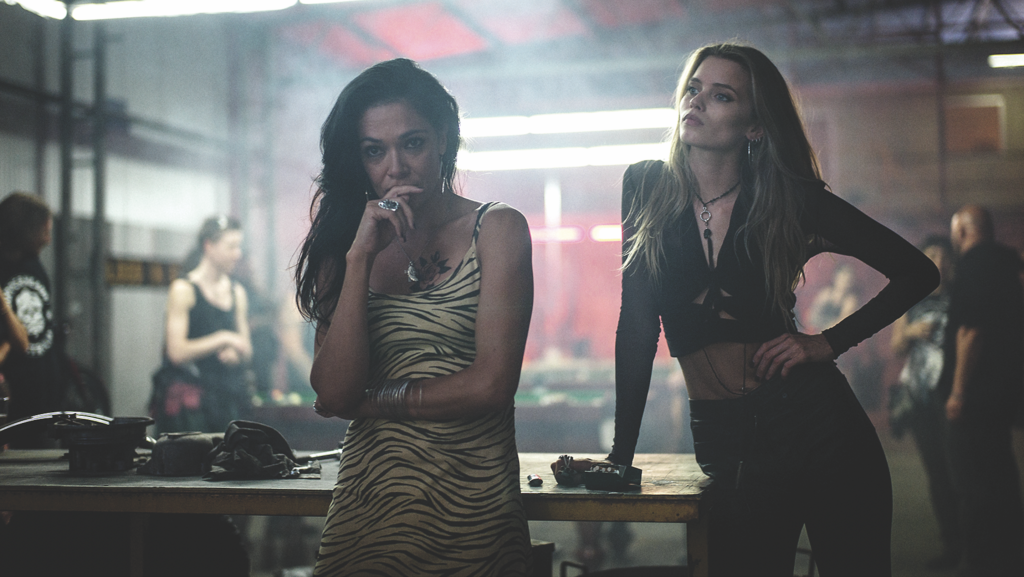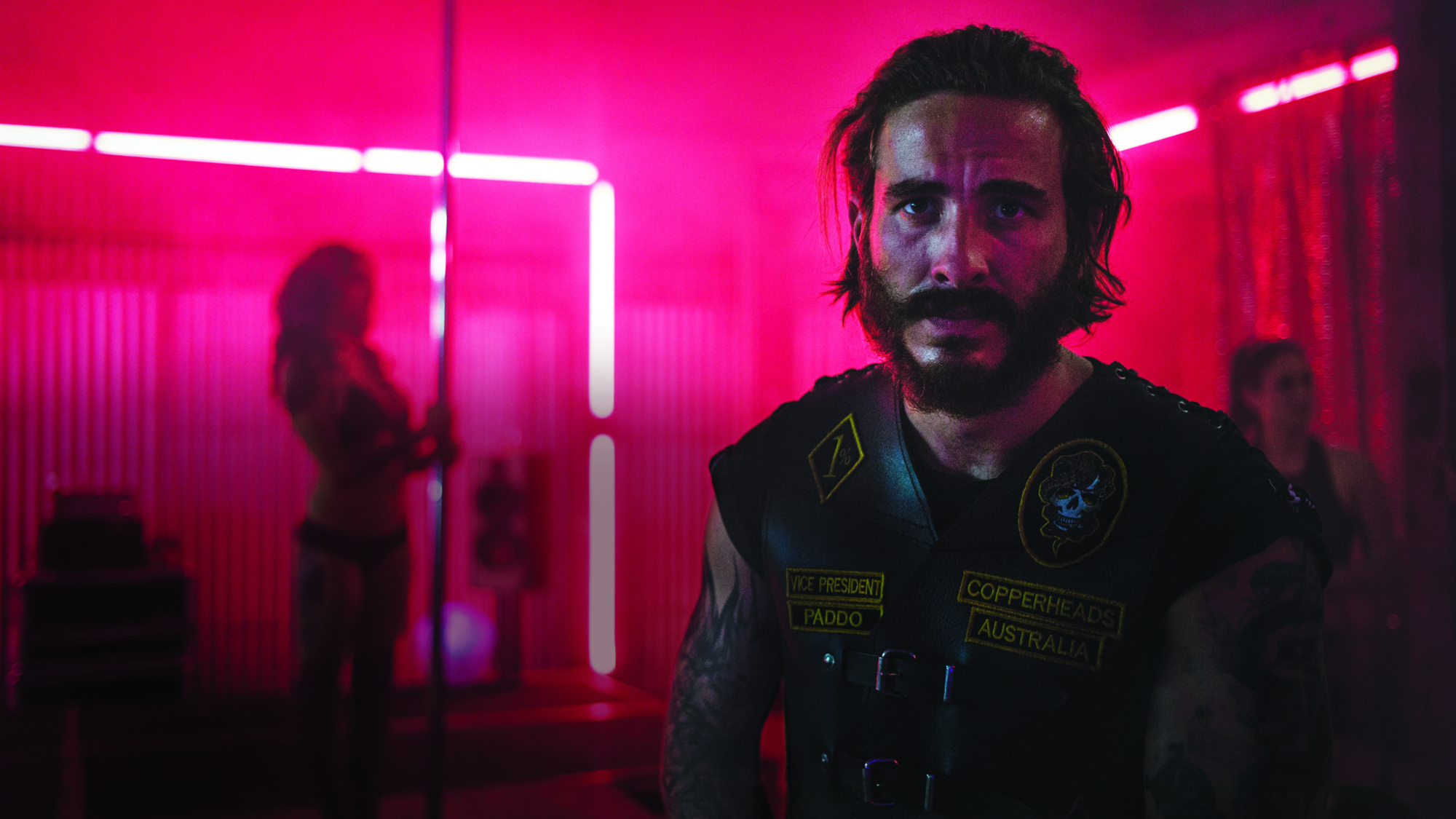‘You look good – way bigger,’ Hayley (Simone Kessell) reassures her husband, Knuck (Matt Nable), shortly before he’s released from prison. Knuck, the violent leader of elite bikie gang The Copperheads Motorcycle Club, does indeed look big. Presumably, in jail, he’s been working out. He’s also been raping other inmates. The drift away from Hayley that follows suggests that incarceration has had a major sexual impact: no longer interested in his wife, Knuck begins ‘grooming’ a young male recruit. He’s also set to resume his place as head of the Copperheads, temporarily under the leadership of club vice-president Paddo (Ryan Corr); unsurprisingly, Paddo isn’t so sure that handing things back to Knuck is a great idea.

Analysis shouldn’t approach a text by focusing on what it’s not. But the title of 1% (Stephen McCallum, 2017), whether intentionally or not, is politically charged – and, as such, feels somewhat like an unfulfilled promise, both in relation to the current political environment and in terms of the crime genre. The Occupy movement’s ‘We are the 99%’ slogan has been a potent tool for drawing public attention to wealth disparities throughout society, targeting the ‘1%’ whose resources and power far outstrip the bulk of the population(s) surrounding them.[1]Mattathias Schwartz, ‘Pre-occupied’, The New Yorker, 28 November 2011, <https://www.newyorker.com/magazine/2011/11/28/pre-occupied>, accessed 15 August 2018. In bikie terms, however, ‘1%’ refers to the elite of the crims.[2]William L Dulaney, ‘A Brief History of “Outlaw” Motorcycle Clubs’, International Journal of Motorcycle Studies, vol. 1, no. 3, November 2005, <http://ijms.nova.edu/November2005/IJMS_Artcl.Dulaney.html>, accessed 15 August 2018. This elite may be distinct from its politico-economic counterpart, but they share a connection to an elevated, overbearing power. And, while McCallum’s bikie gangland drama does touch broadly on the tensions of social and financial inequity, it doesn’t engage with these themes substantially. Even on genre terms, the criminal meandering in 1% never really lives up to the promise of explosive transgression offered by the title.
Instead, 1% depicts a gangland war that, despite lashings of general violence and angst, largely revolves around a clash of management styles. This is far from inappropriate for the genre – what criminal-syndicate movie isn’t, on some level, about the excesses of unbridled capitalism and the jagged ridges of corporate structures?[3]See, by way of comparison, Francesco Rosi’s Lucky Luciano (1973) and Francis Ford Coppola’s The Godfather films (1972–1990). In fact, 1%’s internal leadership conflict unwittingly feels like the natural bikie film for a post-democratic world. Who’s going to run the club? Those not completely immersed in the neoliberal cult of management may be left asking themselves: who cares? Outside of this, 1% operates relatively successfully as a statement on masculinity. The overpowering and thoroughly appalling Knuck is – as his wife points out during their reunion – ‘big’, former rugby-league player Nable (who also wrote the script) expertly portraying a hulking and narcissistic yet brittle presence embodying that particularly nasty strain of hyper-masculinity that equates bulk with power. In contrast to his own ‘big’ presence, Knuck snidely notes rival Sugar’s (Aaron Pedersen) ‘skinny-fat thing’, reinforcing his focus on physical size as a marker of masculine potency.
1% depicts a gangland war that, despite lashings of general violence and angst, largely revolves around a clash of management styles … 1%’s internal leadership conflict unwittingly feels like the natural bikie film for a post-democratic world.
The Paddo-run club that Knuck returns to seems like a pretty laid-back place. They have a nice party for their leader in the clubhouse (the film including by-the-numbers shots of strippers in pink haze), their finances are in order, ‘no trouble’ is the goal, and so on. Presumably, they commit criminal misdeeds the rest of the time to keep things afloat – there’s an ongoing tension around drugs and money thrown into the narrative mix – but we’re never really asked to worry about the club’s day-to-day operations. The important thing is that, under Paddo’s temporary leadership, things are looking pretty sweet; in an amusing touch, they even have branded hoodies.
Knuck’s return is all about reclaiming control and winding back some of the corporatised plushness. ‘We’re a 1% club, not a fucking netball team,’ Hayley says of the hoodies, reinforcing her husband’s merch ban. Knuck’s hyper-aggressiveness goes hand-in-hand with his hugeness: he wields his power ruthlessly, clinging to established methods of maintaining order. Brutal hazings determine who belongs and who doesn’t, and displays of ‘kindness’ hint at worse things to follow. Knuck’s not just an uncomfortably recognisable macho Australian figure: he’s simultaneously a pumped-up, more brutal manifestation of those management types who assert their authority – and display their fear – through rigid micromanagement. If Paddo’s rule represents a modern corporate office, Knuck’s is old-style aggressive capitalism. They’re both in the same business, but one has worse PR and a worse decorator.

Yet the film never quite feels knowing enough to develop this conflict. A violent rapist, Knuck is, of course, a monster, while Paddo is set up as the more sensible candidate: he cleans up after his troubled brother, Skink (Josh McConville); allows more flexibility within the club; listens to his girlfriend, Katrina (Abbey Lee); doesn’t seem to do anything overly unwholesome. But who wants to see a biker movie with Elon Musk or Mark Zuckerberg running a PR-conscious, pseudo-inclusive club full of corporate ‘citizens’? Knuck may be truly repulsive, but he also fulfils the transgressive promise of the title and what the audience ultimately expects of the genre: an out-of-control villain running amok until he inevitably implodes. The meandering Paddo is a hollow distraction, a token symbol of conflict, that stops the film from entering that promised, disturbing realm of the elite (and horrible) ‘1%’. Far from giving us an explosive war, 1% is an HR manager’s fantasy narrative of a bikie gang undergoing a branding crisis.
The entirely in-house nature of the film’s conflict is emphasised by the apparent lack of a surrounding world: can you have a ‘1%’ if there isn’t also a ‘99%’ out there somewhere? 1% has a feeling of openness and emptiness, which gives it an almost-otherworldly feel at times. Despite its industrial-suburban look, 1% could be a science fiction film. If it weren’t for the glimpses of cars in the distance as a horde of bikies roars down a street, the fact that Knuck spends some time in jail or the perfunctory presence of police and paramedics, the entire planet might seem to be populated only by bikers, like a Westworld bikie spin-off or a sequel to the 1964 Twilight Zone episode ‘Black Leather Jackets’. Aesthetically, this creates an insular narrative bubble in which the bustle and complexity of real life are tucked safely out of sight – a perfect match with the modern corporate tendency to place dramatic conflicts in neat, insular packages.
Knuck’s hyper-aggressiveness goes hand-in-hand with his hugeness … If Paddo’s rule represents a modern corporate office, Knuck’s is old-style aggressive capitalism. They’re both in the same business, but one has worse PR and a worse decorator.
It’s here that the film’s critique of masculinity salvages its tepid management conflict. Both Knuck and Paddo, regardless of their varied leadership styles and levels of physical bulk, are ultimately presented as ineffectual: Knuck obviously can’t handle the changes happening around (and to) him, while Paddo is such a flaccid character that he seems he’d be more at home guiding the Copperheads through a reading of Robert M Pirsig’s 1974 book Zen and the Art of Motorcycle Maintenance than a drug deal. These men fall apart whenever things really start to matter – narratively speaking, a fair and perhaps desirable, although hardly new, approach to interrogating hyper-masculinity.
Yet 1% relies on a number of clichés to depict these men’s weakness – particularly as women largely propel their downfalls – which somewhat detracts from its potential to be meaningfully subversive. Paddo must grapple with the initial turmoil caused by Skink having been manipulated by a female drug user he’s sexually pursuing, and it’s Katrina who spurs Paddo on to dethrone Knuck when her boyfriend seems incapable of action. Similarly, the film’s use of hidden sexuality also leans more heavily on worn-out tropes than on nuanced engagement. Knuck claims his rapes are about dominance (‘I’m not a fucking faggot … it makes me a king’), but the final word still goes to Hayley (‘You tell yourself whatever you need to – I don’t care’), and the discovery of Knuck’s implied sexual orientation is still the heteronormative ‘shock’ at the centre of the film that drives its events to their destructive climax. It’s certainly easy to read all of these as statements on hyper-masculine culture’s impotence, but, when they’re presented without the finer details of character, the simplistic trope of the instigating, manipulating woman seems to be all that’s left.

During the Q&A following 1%’s Australian premiere at last year’s Adelaide Film Festival (AFF), Shakespeare was name-dropped a fair bit, with McCallum previously having referred to the script’s ‘strong Shakespearean themes’[4]Stephen McCallum, quoted in Dino-Ray Ramos, ‘1% Teaser Trailer: Outlaw Motorcycle Gangs Rev Their Engines in Crime Thriller from Australia – TIFF’, Deadline Hollywood, 4 September 2017, <http://deadline.com/2017/09/1-percent-teaser-trailer-tiff-toronto-international-film-festival-stephen-mccallum-matt-nable-motorcycle-gang-1202160199/>, accessed 15 August 2018. and Shakespearean qualities referenced in coverage of 1% by FilmInk, [5]Liam Dunn, ‘Stephen McCallum: 100% Street Cred’, FilmInk, 7 June 2018, <https://www.filmink.com.au/stephen-mccallum-100-street-cred/>, accessed 15 August 2018. The Sydney Morning Herald, [6]Stephanie Bunbury, ‘“A Rollercoaster”: Australian Takes Feature Film Debut 1% to Toronto Film Festival’, The Sydney Morning Herald, 10 September 2017, <http://www.smh.com.au/entertainment/movies/a-rollercoaster-australian-takes-feature-film-debut-1-to-toronto-film-festival-20170910-gyei72.html>, accessed 15 August 2018. The Playlist, [7]Andrew Crump, ‘1%: Biker Gang Drama Tries to Breathe Life into the Outlaw Genre [TIFF Review]’, The Playlist, 9 September 2017, <https://theplaylist.net/1-percent-tiff-review-20170909/>, accessed 15 August 2018. The Upcoming[8]Catherine Sedgwick, ‘1%’, The Upcoming, 2 October 2017, <https://www.theupcoming.co.uk/2017/10/02/london-film-festival-2017-1-review/>, accessed 15 August 2018. and The Reel Bits. [9]Richard Gray, ‘Review: 1%’, The Reel Bits, 15 June 2018, <https://thereelbits.com/2018/06/15/review-1/>, accessed 15 August 2018. With machinations to topple a king-like leader, somewhat-petty personal dramas and at least one Lady Macbeth–like driving force, 1%’s power struggle does owe more to Macbeth than to anything connected to the Occupy movement. But it’s probably worth resisting some of the eager comparisons as well. While 1% has been marketed as ‘a story of brotherhood, loyalty, ambition and betrayal’,[10]Icon Films, 1% press kit, 2018, p. 2. at AFF, McCallum also described it as dealing with ‘universal’ themes – so summoning the word ‘Shakespearean’ might just be a loose way of legitimising fairly generic themes and plot points.
In a sense, 1%’s ‘universality’ could be its primary shortcoming: it could be a mob movie, or a western, or just about any genre work in which two hyper-masculine rivals butt heads. Yet, for all its faults, 1% is still a strong work. The film is polished and professional enough to stand up on commercial screens, and Nable’s script – along with his dominating performance – threads dialogue and characterisation more carefully than plenty of larger productions do, even if the misfire of the central thematic conflict dilutes its effectiveness. Had Knuck and Hayley taken centre stage, and the non-conflict with Paddo been disposed of, 1% might have ended up a brutal and truly ugly Australian crime classic.
The film’s critique of masculinity salvages its tepid management conflict. Both Knuck and Paddo, regardless of their varied leadership styles and levels of physical bulk, are ultimately presented as ineffectual … These men fall apart whenever things really start to matter.
Knuck and Paddo’s differing expressions of masculinity and leadership may provide 1%’s main point of interest, but the film never quite finds a worthwhile place to take this interrogation to. When the dust finally clears and the club decides on a leader, it’s difficult to see – as with the capitalist illusion of choice – why one particular shuffling of management roles really matters more than another.
Endnotes
| 1 | Mattathias Schwartz, ‘Pre-occupied’, The New Yorker, 28 November 2011, <https://www.newyorker.com/magazine/2011/11/28/pre-occupied>, accessed 15 August 2018. |
|---|---|
| 2 | William L Dulaney, ‘A Brief History of “Outlaw” Motorcycle Clubs’, International Journal of Motorcycle Studies, vol. 1, no. 3, November 2005, <http://ijms.nova.edu/November2005/IJMS_Artcl.Dulaney.html>, accessed 15 August 2018. |
| 3 | See, by way of comparison, Francesco Rosi’s Lucky Luciano (1973) and Francis Ford Coppola’s The Godfather films (1972–1990). |
| 4 | Stephen McCallum, quoted in Dino-Ray Ramos, ‘1% Teaser Trailer: Outlaw Motorcycle Gangs Rev Their Engines in Crime Thriller from Australia – TIFF’, Deadline Hollywood, 4 September 2017, <http://deadline.com/2017/09/1-percent-teaser-trailer-tiff-toronto-international-film-festival-stephen-mccallum-matt-nable-motorcycle-gang-1202160199/>, accessed 15 August 2018. |
| 5 | Liam Dunn, ‘Stephen McCallum: 100% Street Cred’, FilmInk, 7 June 2018, <https://www.filmink.com.au/stephen-mccallum-100-street-cred/>, accessed 15 August 2018. |
| 6 | Stephanie Bunbury, ‘“A Rollercoaster”: Australian Takes Feature Film Debut 1% to Toronto Film Festival’, The Sydney Morning Herald, 10 September 2017, <http://www.smh.com.au/entertainment/movies/a-rollercoaster-australian-takes-feature-film-debut-1-to-toronto-film-festival-20170910-gyei72.html>, accessed 15 August 2018. |
| 7 | Andrew Crump, ‘1%: Biker Gang Drama Tries to Breathe Life into the Outlaw Genre [TIFF Review]’, The Playlist, 9 September 2017, <https://theplaylist.net/1-percent-tiff-review-20170909/>, accessed 15 August 2018. |
| 8 | Catherine Sedgwick, ‘1%’, The Upcoming, 2 October 2017, <https://www.theupcoming.co.uk/2017/10/02/london-film-festival-2017-1-review/>, accessed 15 August 2018. |
| 9 | Richard Gray, ‘Review: 1%’, The Reel Bits, 15 June 2018, <https://thereelbits.com/2018/06/15/review-1/>, accessed 15 August 2018. |
| 10 | Icon Films, 1% press kit, 2018, p. 2. |





